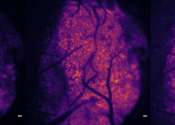Multi-infarct dementia is one type of vascular dementia. Vascular dementia is the second most common form of dementia after Alzheimer's disease (AD) in older adults. Multi-infarct dementia (MID) is thought to be an irreversible form of dementia, and its onset is caused by a number of small strokes or sometimes, one large stroke preceded or followed by other smaller strokes. The term refers to a group of syndromes caused by different mechanisms all resulting in vascular lesions in the brain. Early detection and accurate diagnosis are important, as vascular dementia is at least partially preventable.
The main subtypes of this disease are: mild cognitive impairment, multi-infarct dementia, vascular dementia due to a strategic single infarct (affecting the thalamus, the anterior cerebral artery, the parietal lobes or the cingulate gyrus), vascular dementia due to hemorrhagic lesions, and mixed Alzheimer's and vascular dementia.
Vascular lesions can be the result of diffuse cerebrovascular disease or focal lesions; usually both. Mixed dementia is diagnosed when patients have evidence of AD and cerebrovascular disease, either clinically or based on neuroimaging evidence of ischemic lesions. In fact vascular dementia and Alzheimer's disease often coexist, especially in older patients with dementia.
MID is sometimes triggered by cerebral amyloid angiopathy, which involves accumulation of beta amyloid plaques in the walls of the cerebral arteries, leading to breakdown and rupture of the vessels. Since amyloid plaques are a characteristic feature of AD, vascular dementia may occur as a side effect of it. However, CAA can also appear in people with no prior dementia condition.
